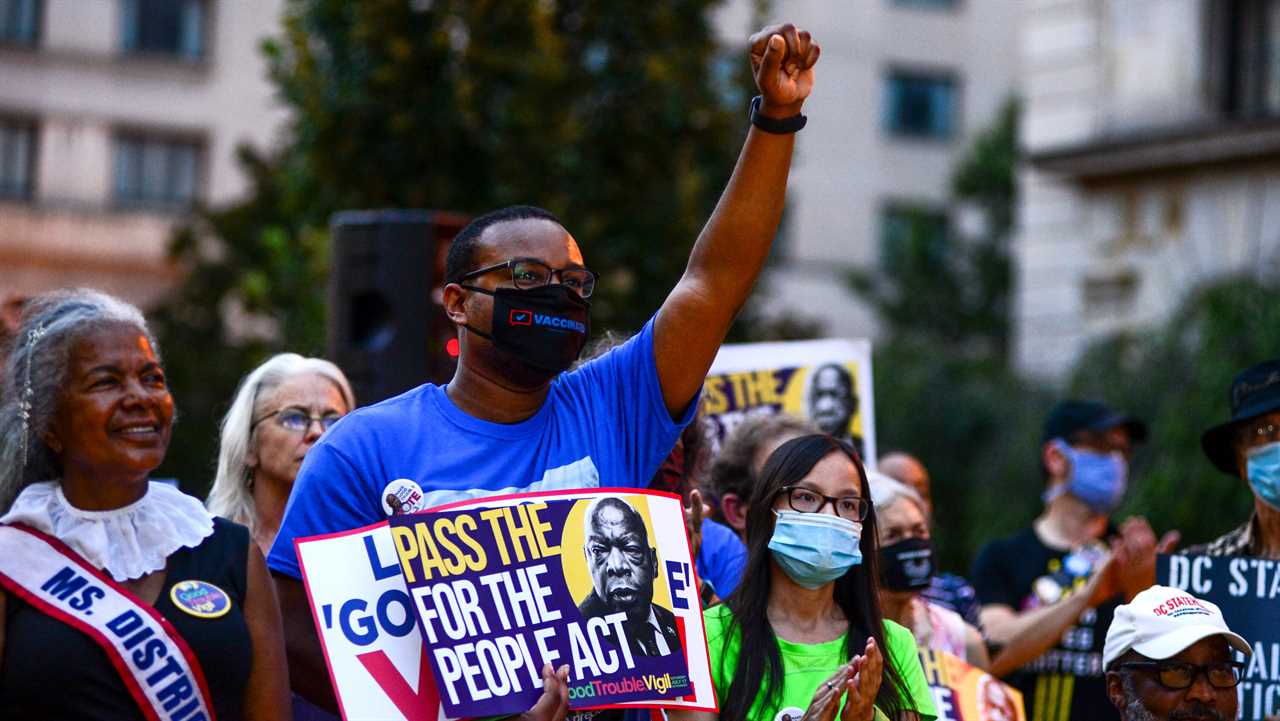
WASHINGTON — A quiet divide between President Biden and the leaders of the voting rights movement burst into the open on Thursday, as 150 organizations urged him to use his political mettle to push for two expansive federal voting rights bills that would combat a Republican wave of balloting restrictions.
In the letter, signed by civil rights groups including the Leadership Conference and the National Association for the Advancement of Colored People, activists argued that with the “ideal of bipartisan cooperation on voting rights” nowhere to be found in a sharply divided Senate, Mr. Biden must “support the passage of these bills by whatever means necessary.”
The issue is of paramount importance to Democrats: Republicans have passed roughly 30 laws in states across the country this year that are likely to make voting harder, especially in Black and Latino communities, which lean Democratic. Several of the laws give state legislators more power over how elections are run and make it easier to challenge the results.
In a fiery speech in Philadelphia last week, Mr. Biden warned that the G.O.P. effort was the “most significant test of our democracy since the Civil War.”
But the president and voting rights advocates are increasingly in disagreement about how to pass that test.
Mr. Biden, a veteran of the Senate who for decades has believed in negotiating on the particulars of voting rights legislation, has faced calls to push Democratic senators to eliminate the filibuster, which would allow the two major voting bills proposed by the party to pass with a simple majority. The president and his advisers have repeatedly pointed out that he does not have the votes within his own party to pass federal voting legislation, and does not have the power to unilaterally roll back the filibuster even if he supported doing so.
But voting rights groups say that Mr. Biden is not expending sufficient political capital or using the full force of his bully pulpit to persuade Congress. They point to the contrast between his soaring language — “Jim Crow on steroids,” he has called the G.O.P. voting laws — and his opposition to abolishing the Senate filibuster.
“As you noted in your speech, our democracy is in peril,” the groups said in their letter. “We certainly cannot allow an arcane Senate procedural rule to derail efforts that a majority of Americans support.”
Ultimately, the advocates fear that the Biden administration — currently focused on a bipartisan infrastructure deal and an ambitious spending proposal — has largely accepted the Republican restrictions as baked in, and is now dedicating more of its effort to juicing Democratic turnout.
In private calls with voting rights groups and civil rights leaders, White House officials and close allies of the president have expressed confidence that it is possible to “out-organize voter suppression,” according to multiple people familiar with the conversations.
“I have heard an emphasis on organizing,” said Sherrilyn A. Ifill, the president and director-counsel of the NAACP Legal Defense and Educational Fund, who visited the Oval Office to meet with the president two weeks ago. But, she added, “we cannot litigate our way out of this and we cannot organize our way out of this.”
Several Biden advisers involved in the private calls said this week that they did not recall telling attendees that voter suppression could be out-organized, but said organizing was integral to the administration’s efforts.
Broadly, Mr. Biden’s advisers insist that the administration is committed to protecting access to the ballot and passing two federal bills: the For the People Act, an overhaul of federal election laws that was considered more of a political statement than viable legislation when it was first introduced in 2019, and the John Lewis Voting Rights Advancement Act, which would restore important parts of the Voting Rights Act that the Supreme Court stripped away in 2013.
Republicans have castigated the For the People Act as overreaching and partisan. And Senator Mitch McConnell of Kentucky, the minority leader, has said there is no need for a bill restoring parts of the Voting Rights Act.
White House officials privately note that even if Mr. Biden came out in support of ending the filibuster, moderate Democrats, including Senator Joe Manchin III of West Virginia and Senator Kyrsten Sinema of Arizona, have publicly resisted such a move. Mr. Manchin has also called the For the People Act a piece of “partisan” legislation.
When asked whether the administration’s focus had shifted toward political organizing and opposing the G.O.P. laws in the courts, the officials say that critics who are focused on federal voting protections are misinterpreting the president’s public remarks.
Cedric Richmond, a senior adviser to Mr. Biden and a former congressman from Louisiana, said in an interview that advocates who have zeroed in on Mr. Biden’s comments about organizing should see them as one part of the administration’s broader work on voting rights.
“I think it’s very clear what he said,” Mr. Richmond said of the president’s speech in Philadelphia. “Which is: We’re going to have to meet this challenge in the courts, in the halls of Congress and in the streets.”
But in interviews, more than 20 civil rights leaders and voting rights advocates said that while they believed in Mr. Biden’s conviction to protect the right to vote, they thought his call for a “new coalition” of Americans to take up the issue was not what they needed from the White House.
Some advocates found this approach — the idea that the vaunted voter registration, education and get-out-the-vote efforts that helped propel Mr. Biden to victory could be used against G.O.P. voting laws — naïve at best, signaling that the White House viewed the issue as simply an election challenge, rather than a moral threat to broad civil rights progress.






